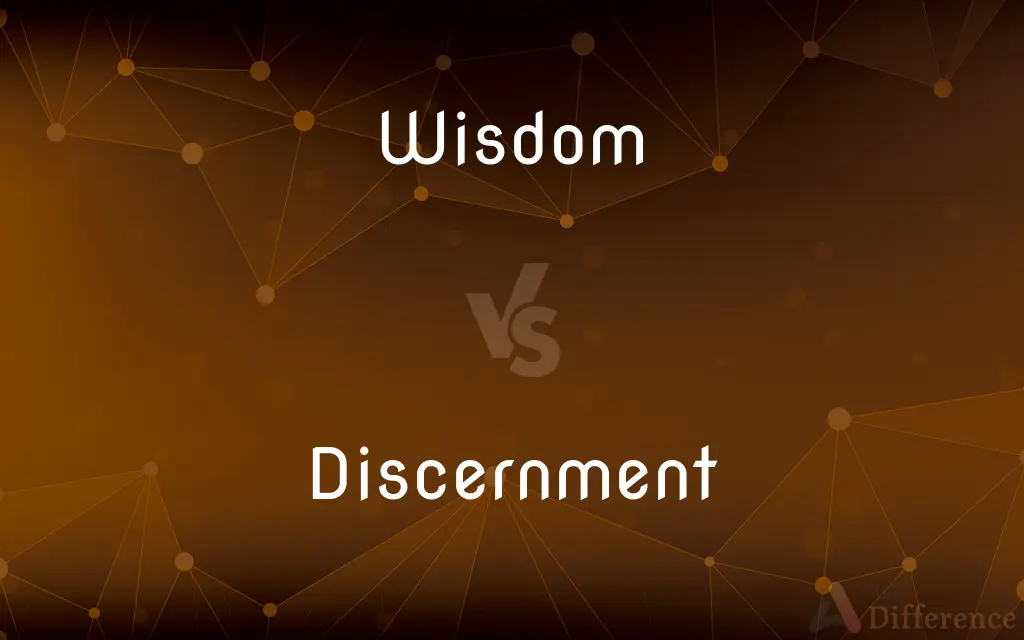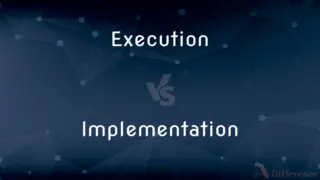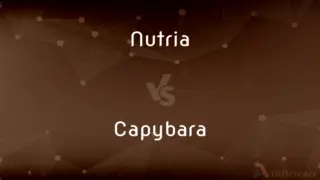Wisdom vs. Discernment — What's the Difference?
By Tayyaba Rehman — Updated on November 4, 2023
Wisdom is the judicious application of knowledge, while discernment is the ability to judge well.

Difference Between Wisdom and Discernment
Table of Contents
ADVERTISEMENT
Key Differences
Wisdom encompasses the accumulation of knowledge and the insightful application of said knowledge in life. It’s an understanding that extends beyond facts and practicalities, integrating experiences and learned lessons over time to navigate complexities of life. Discernment, in relation to wisdom, is a facet or a process; it’s the ability to make judicious decisions and to distinguish between truths, falsehoods, and semi-truths. It is the skill in perceiving and understanding through insight and without relying solely on apparent evidence.
Wisdom, in essence, is the broader, all-encompassing trait that signifies not only having knowledge but also the practical intelligence to apply that knowledge effectively. It’s having foresight and insight. Discernment is the exercise of that wisdom in specific instances; it is the acute judgment that is applied in situations to decide the most beneficial course of action. Wisdom is the foundation, while discernment is the action.
Wisdom involves learning from the past, understanding the present, and making predictions about the future. It is a blend of intuition, experience, and knowledge leading to a well-rounded view of life. Discernment, on the other hand, is often employed in more immediate situations—it is the critical thinking skill that allows one to evaluate information, arguments, and characters thoroughly.
When wisdom and discernment intersect, individuals not only grasp the deeper meaning of facts and situations but also understand the implications of various choices and can foresee potential outcomes. Wisdom might tell you what is important in life, whereas discernment helps you prioritize those important things when making decisions day-to-day.
The relationship between wisdom and discernment is synergistic. Wisdom guides a person’s values and principles, and discernment applies those values and principles to make the right choices. Thus, while wisdom provides the content, discernment provides the process.
ADVERTISEMENT
Comparison Chart
Definition
The quality of having experience and knowledge
The ability to judge well
Application
Broad, life-encompassing
Specific, situation-focused
Function
Integrative thinking and decision-making
Critical evaluation and judgement
Focus
Principles and meanings
Choices and distinctions
Relationship with Knowledge
Use and application of knowledge
Critical analysis and understanding of knowledge
Compare with Definitions
Wisdom
Insight gained from life experiences that guides actions.
His wisdom prevented the young athlete from making hasty decisions about his career.
Discernment
The capacity to distinguish between similar things or to appreciate subtleties.
His discernment of fine wines made him an excellent sommelier.
Wisdom
Practical application of knowledge to achieve the best outcome.
His wisdom led the company through tough times with innovative strategies.
Discernment
Sensitivity in perception to make careful judgments.
Her discernment in fashion led to a successful line of haute couture.
Wisdom
The ability to discern inner qualities and relationships.
With wisdom, she navigated her career with astute choices that aligned with her values.
Discernment
Acute insight into people or situations.
His discernment allowed him to detect the flaws in the argument swiftly.
Wisdom
Wisdom, sapience, or sagacity is the ability to think and act using knowledge, experience, understanding, common sense and insight. Wisdom is associated with attributes such as unbiased judgment, compassion, experiential self-knowledge, self-transcendence and non-attachment, and virtues such as ethics and benevolence.Wisdom has been defined in many different ways, including several distinct approaches to assess the characteristics attributed to wisdom.
Discernment
The ability to judge well in any matter.
Her discernment was apparent when she chose the most skilled candidate for the job.
Wisdom
The ability to discern or judge what is true, right, or lasting; insight.
Discernment
Discernment is the ability to obtain sharp perceptions or to judge well (or the activity of so doing). In the case of judgement, discernment can be psychological, moral or aesthetic in nature.
Wisdom
Common sense; good judgment
"It is a characteristic of wisdom not to do desperate things" (Henry David Thoreau).
Discernment
The ability to judge well
An astonishing lack of discernment
Wisdom
The sum of learning through the ages; knowledge
"In those homely sayings was couched the collective wisdom of generations" (Maya Angelou).
Discernment
The act or process of exhibiting keen insight and good judgment.
Wisdom
Wise teachings of the ancient sages.
Discernment
Keenness of insight and judgment.
Wisdom
A wise outlook, plan, or course of action.
Discernment
The ability to distinguish; judgement.
Wisdom
Wisdom(Bible) Wisdom of Solomon.
Discernment
The act of distinguishing between things.
Wisdom
(uncountable) An element of personal character that enables one to distinguish the wise from the unwise.
Discernment
The ability to distinguish between things.
Wisdom
(countable) A piece of wise advice.
Discernment
The ability to perceive differences that exist.
Wisdom
The discretionary use of knowledge for the greatest good.
Discernment
The condition of understanding.
Wisdom
The ability to apply relevant knowledge in an insightful way, especially to different situations from that in which the knowledge was gained.
Discernment
Aesthetic discrimination; taste, appreciation.
Wisdom
The ability to make a decision based on the combination of knowledge, experience, and intuitive understanding.
Discernment
Perceptiveness.
Wisdom
(theology) The ability to know and apply spiritual truths.
Discernment
The ability to make wise judgements; sagacity.
Wisdom
(rare) A group of wombats.
Discernment
Discretion in judging objectively.
Wisdom
(rare) A group of owls.
Discernment
The act of discerning.
Wisdom
The quality of being wise; knowledge, and the capacity to make due use of it; knowledge of the best ends and the best means; discernment and judgment; discretion; sagacity; skill; dexterity.
We speak also not in wise words of man's wisdom, but in the doctrine of the spirit.
Behold, the fear of the Lord, that is wisdom; and to depart from evil is understanding.
It is hoped that our rulers will act with dignity and wisdom that they will yield everything to reason, and refuse everything to force.
Common sense in an uncommon degree is what the world calls wisdom.
Discernment
The power or faculty of the mind by which it distinguishes one thing from another; power of viewing differences in objects, and their relations and tendencies; penetrative and discriminate mental vision; acuteness; sagacity; insight; as, the errors of youth often proceed from the want of discernment.
Wisdom
The results of wise judgments; scientific or practical truth; acquired knowledge; erudition.
Moses was learned in all the wisdom of the Egyptians, and was mighty in words and in deeds.
Knowledge and wisdom, far from being one,Have ofttimes no connection. Knowledge dwellsIn heads replete with thoughts of other men;Wisdom, in minds attentive to their own.Knowledge, a rude, unprofitable mass,The mere materials with which wisdom builds,Till smoothed, and squared, and fitted to its place,Does but encumber whom it seems to enrich.Knowledge is proud that he has learned so much;Wisdom is humble that he knows no more.
Discernment
The cognitive condition of someone who understands;
He has virtually no understanding of social cause and effect
Wisdom
Accumulated knowledge or erudition or enlightenment
Discernment
Delicate discrimination (especially of aesthetic values);
Arrogance and lack of taste contributed to his rapid success
To ask at that particular time was the ultimate in bad taste
Wisdom
The trait of utilizing knowledge and experience with common sense and insight
Discernment
Perception of that which is obscure
Wisdom
Ability to apply knowledge or experience or understanding or common sense and insight
Discernment
Ability to make good judgments
Wisdom
The quality of being prudent and sensible
Discernment
The trait of judging wisely and objectively;
A man of discernment
Wisdom
An Apocryphal book consisting mainly of a meditation on wisdom; although ascribed to Solomon it was probably written in the first century BC
Discernment
The quality of being able to grasp and comprehend what is obscure.
Through discernment, she recognized the true intent behind his words.
Wisdom
The quality of having deep understanding and sound judgment.
Her wisdom shone through when she resolved the conflict with patience and foresight.
Wisdom
Philosophical understanding of what is truly important in life.
Her wisdom was evident when she spoke about the impermanence of success and the value of contentment.
Common Curiosities
Is wisdom teachable?
While experiences can be shared, true wisdom often comes from personal growth and learning over time.
Can you have discernment without wisdom?
Yes, you can have the ability to discern without having the full breadth of wisdom, which includes experience and knowledge.
Can you have wisdom without discernment?
Wisdom typically includes discernment as a component, so having wisdom implies an ability to discern.
What is wisdom?
Wisdom is the quality of having extensive knowledge and experiences and making good judgments and decisions based on them.
Is wisdom always right?
Wisdom is not infallible, but it generally leads to more favorable outcomes due to its foundation in experience and knowledge.
Does age equate to wisdom?
Age often correlates with wisdom due to more life experiences, but it is not a guaranteed equivalence.
What is discernment?
Discernment is the ability to judge well and make accurate distinctions in various matters.
Can young people have discernment?
Yes, even young individuals can display discernment, particularly in areas where they have knowledge or expertise.
How is discernment developed?
Discernment is developed through practice, critical thinking, and enhancing one's ability to observe and understand.
Can discernment be biased?
Discernment can be influenced by personal biases, though ideally, it should be objective.
Can discernment be wrong?
Discernment is subject to error, especially if based on incomplete information or biases.
Is there a cultural aspect to wisdom?
Wisdom can be culturally influenced as it often includes values, beliefs, and experiences unique to one's cultural background.
Is wisdom static or dynamic?
Wisdom is dynamic as it grows and evolves with new experiences and information.
Does discernment involve intuition?
Discernment can involve intuition, but it primarily relies on reasoned judgment and critical thinking.
Do wisdom and discernment improve with education?
Education can enhance both wisdom and discernment by providing knowledge and critical thinking skills.
Share Your Discovery

Previous Comparison
Execution vs. Implementation
Next Comparison
Nutria vs. CapybaraAuthor Spotlight
Written by
Tayyaba RehmanTayyaba Rehman is a distinguished writer, currently serving as a primary contributor to askdifference.com. As a researcher in semantics and etymology, Tayyaba's passion for the complexity of languages and their distinctions has found a perfect home on the platform. Tayyaba delves into the intricacies of language, distinguishing between commonly confused words and phrases, thereby providing clarity for readers worldwide.















































